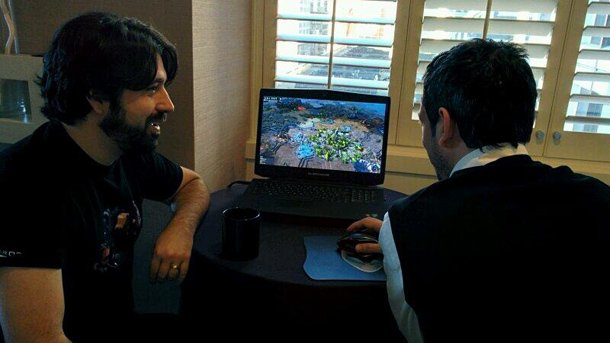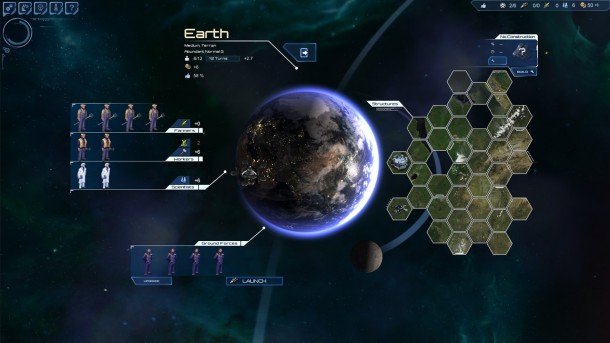Interview: Endless Space and StarDrive developers talk about 4X design

At the Game Developers Conference in March I previewed Endless Legend , a fantasy 4X strategy game from Amplitude Studios that is now available on Steam Early Access. I wanted to spend more time talking to Amplitude's creative director, Romain de Waubert de Genlis (above right), about the recent resurgence of the 4X genre and the success of his previous game Endless Space . We decided to talk over lunch with another 4X designer, Daniel DiCicco (above left), who is working on a sequel to his indie success StarDrive . Over the course of an hour we discussed different approaches to 4X design, their all-time favorite 4Xs, what they think the genre is missing, and more.
It's a long, meaty conversation about one of the most complex corners of PC gaming. Read on to join us for lunch.
Wes Fenlon, PC Gamer: To start off with a topic: [Romain], earlier we were talking about you having a really active community for the first version of your game. You guys had that with Games2Gether , fostering that. Let's talk about doing early access to your games and how that influences your development process.
Romain de Waubert de Genlis, Amplitude Studios: Although we've been in the industry for quite a bit, and we're big fans of 4X, we had to look at how to make a 4X. We had some ideas, but what I was really scared about was the balancing in the end. There are so many things. A game that lasts 10 or 12 hours, generally what you tend to do is play a lot of the beginning and polish it, but it's really hard to get the proper data to balance a game through the end. It needs to be interesting until the end. It needs to have stuff coming in that balances out the rest of the game.
That's one of the two reasons why we came to Games2Gether, to make sure that we had people who could help us and teach us how to make a 4X, particularly on the balancing side. On the technical side or the art side, we're not that scared. I wasn't too scared about any of the global ideas. Just the balancing. And also not having people get drawn into the details. It was a mix of that.
The thing is, when you're unknown, you need to find a way to have people that want to share the adventure with you. With that, what we saw in Games2Gether… Let's promise that we can create the game in front of them and include them in the process, so they really are part of the creation of the game. That way, as a player, I would find that a lot more attractive than just playing the part of a witness.
Dan DiCicco, Zero Sum Games: For StarDrive, we didn't have anything quite so formal as the Games2Gether, but we had a similar approach. Including the community early on, saying, we're going to make this game in front of you. The feedback that we got helped shape the game, and it's also very encouraging, to see that people like the first course. Here's what we've made up, here's what we're trying to do. They care enough to come back to the forums and post about it and tell you all the things they like or don't like. It helps me keep going, day to day.
Keep up to date with the most important stories and the best deals, as picked by the PC Gamer team.
PCG: What changed with the first StarDrive, getting feedback from people playing it?
Dan: There were some major systems that didn't even exist at the beginning. They came into being after people played the game and said, hey, it would be really nice if we could manage the power grids on our ships. StarDrive had this module-based ship construction system, and we added this SimCity-like power management, so you have to make sure all your modules are powered.
I love our community. It has its drawbacks, too. We learned the hard way, every time you engage with your community and tell them about something you intend to do, it's basically treated as an implied promise, even if it's not an actual promise. For me, I screwed up by saying I wanted to do multiplayer, and then decided after exploring the concept further that it wasn't realistic for StarDrive. I made a lot of people mad by doing that. There's a downside to strong community engagement also.

Romain: Yeah, I'd agree with that. For us, what we're trying to do is make sure that we have a scope which is very clear. We want to make sure that the vision is clear to everyone. We try not to go outside that vision.
People can get hurt easily if you say, this is what my game's going to be about, and then you change it. This is also why we didn't want to go on Kickstarter. I had many chances to change the game. The game begins as one thing and it ends as something else. As you make it, the game evolves. Some stuff that you promise at first turns out to just not be fun or interesting or challenging. It's better to kill that and do something else instead. With a Kickstarter, people pay money ahead of time for a feature that's on the Kickstarter. If I remove it, what happens?
That's why we wanted to make sure that we paid for the whole game. When people pay for the game before it's released, before they can play the game, when the game comes out, there's already a contract between them and the creator. But we did have some stuff that we kind of promised. Multiplayer is a tricky one. As players and designers, it was awesome. Technically, getting more into the details, it was more and more difficult. We'll do it, but it'll be painful.
Dan: A similar concept has been on my mind lately. A lot of indies have chosen to be full-on indie, but both of us have chosen to partner with a publisher. To me, the benefits seem obvious. There's a lot of noise out there. There's a lot of games. It's easy to get lost. It's nice to have partners who know more about business. What do you think about that?
Romain: I think our approach is a bit different from yours, because we don't have the same relationship with Iceberg. First, when we decided to work with [publisher Iceberg Interactive], we were already working directly with Steam. But at the same time, we knew that Steam was only 90 percent of the digital sales we could make. We also knew that a boxed version could work out in some territories. We wanted to have boxes. That's why I came to Iceberg. I wanted them to take care of that 10 percent, and the boxes. Also, we asked them to take care of PR and promotion, because again, we didn't have time and resources to take care of that. We wanted to focus on what we can do best. At the same time, we lead the communication at stages.
Dan: My relationship with Iceberg is different, I think. Part of it is the structure of our company. You have 35 guys now?
Romain: And you have one.
Dan: Yeah, I have one, plus a bunch of freelancers. When I started, I hadn't ever made a video game. Here were people who knew the industry. They knew how to get a game to market. If I'd tried to be a completely solo indie, I just might have been lost. I see a lot of indies out there making a lot of success, and I think that can be a bit misleading to people who are trying to break into the scene. They all want to be the big hit, but they don't realize that there's so much more.
It's not just making the game. It's marketing the game. Things like [GDC], where you can meet with journalists. It's been on my mind lately.
Romain: For us, we're able to do more on that side, because we had a lot of publishing-side experience previously. It may come out wrong, the way I say it. But from what I've seen, being on the publishing side, I realized that publishers were probably the worst ones at selling indie games. Each time, I was seeing these games that we were making, and you always had some marketing guy coming in with his own recipe. Which is the same for every game that he ever does. You do a small game, and it's the same recipe as for any other—web advertising, TV if you can. Wait, what if I don't have TV? What will I do? I don't have TV [ads] on this game! I'm lost!
That's why we realized, if we went with a publisher who would lead the communication, again, we'd be on this classical way of doing things. We know that's not the way to do it with a smaller game. We're only aiming at an audience of maybe 60,000. That's what we're hoping for. And they're all over. We have a few thousand in France, a few thousand in Germany, a few thousand in the U.S. Traditional advertising wouldn't reach those guys. We knew we had to find another way. That's why we chose this community-centric approach.

Wes has been covering games and hardware for more than 10 years, first at tech sites like The Wirecutter and Tested before joining the PC Gamer team in 2014. Wes plays a little bit of everything, but he'll always jump at the chance to cover emulation and Japanese games.
When he's not obsessively optimizing and re-optimizing a tangle of conveyor belts in Satisfactory (it's really becoming a problem), he's probably playing a 20-year-old Final Fantasy or some opaque ASCII roguelike. With a focus on writing and editing features, he seeks out personal stories and in-depth histories from the corners of PC gaming and its niche communities. 50% pizza by volume (deep dish, to be specific).

